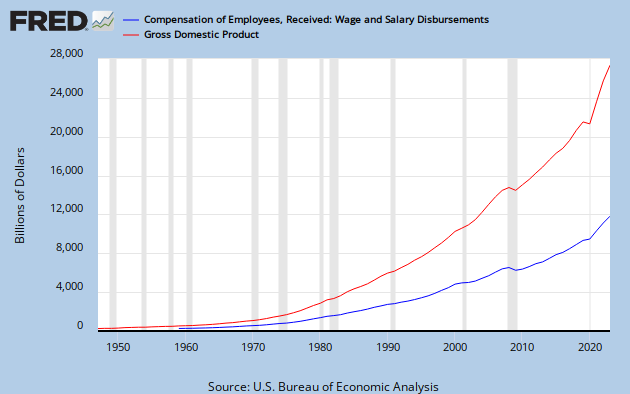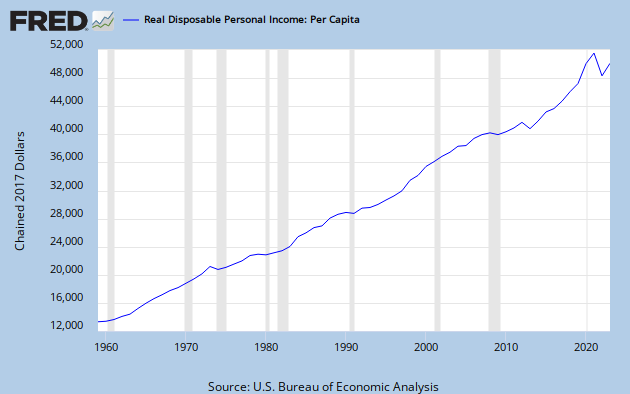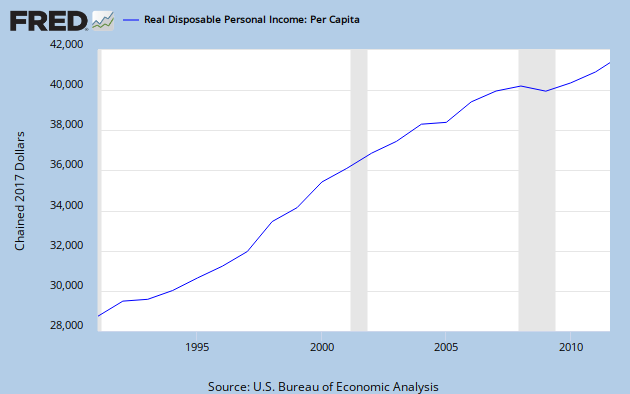Once upon a time, the debate over global warming and climatic change was mildly amusing to me. I could point out the false assumptions, the inadequate science, the contrarian historical evidence, and the typical human arrogance wrapped up in the matter, but I’ve grown very tired of it all now. As I noted several years ago, the obvious and most practical “solution” is already at hand, and I will revisit that in part today.
First, though, I put solution in quotes above because the most important potentially false assumption is that global warming is a problem at all. It may well be, but the facts are not yet in evidence for such a conclusion. Our models are inadequate and have failed to accurately predict outcomes thus far. Alarmism simply isn’t warranted.
Nevertheless, as I’ve previously stipulated, climatic change is something we should be concerned about. There is ample historical evidence for this, and in the longest term, we will have to actively manage the climatic conditions of our habitats, wherever or whatever they may be, if we would have human life and civilization continue indefinitely into the future. The short-term risks, though, are minimal and probably self-correcting.
The real problem, in my opinion, is that legitimate scientific inquiry and concern have been co-opted by political factions that are anti-capitalist and to some degree anti-human. They would slow, halt, or even reverse economic development for a variety of reasons, ranging from misguided environmentalism to outright misanthropy. These factions have spread the dubious alarm and fanned the flames of fear to engender public support for their political goals—and if their most radical proposals are enacted, billions of people will have to die. We will have replaced a remotely possible climatic catastrophe with a very certain political catastrophe.
For the most part, the way to mitigate potential climatic disasters is to keep doing what we have been doing throughout much of the modern era: lifting more and more people out of poverty through global economic development, reducing environmental pollution through improvements in energy technologies, and adapting to ecological changes when necessary. While our times are historically exceptional, these processes aren’t anywhere close to their theoretical limits. Taking the optimistic view, human civilization is only at the end of its beginning.
No! We’re at the beginning of the end! If we don’t do something right now, global warming will lead to mass extinctions and render the planet uninhabitable! Or so the alarmists would have us think. This doomsaying would be laughable … if it weren’t becoming the mainstream narrative believed by so many otherwise reasonable people.
That brings me back to the most obvious and practical solution to the technical problem of climatic management. The primary driver of climatic effects and cycles is solar radiation, sunlight. If we want to control or at least manage the terrestrial climate, the simplest and most direct way would be to control insolation, the amount of sunlight that reaches Earth’s surface.
There are several so-called geoengineering proposals that could achieve this, but the safest and most straightforward would be a series of orbital reflectors or shades. A constellation of such satellites could regulate global temperatures in a dynamic and very controllable manner, decreasing or increasing insolation as required. It’s a solution that would be both elegant and permanent.
The cost of such a program would not be insubstantial, but it wouldn’t be outrageous either. The technological concepts are decades old and would require no scientific breakthroughs to implement. I expect that initial development and deployment of the system would require less than $100 billion. Ongoing maintenance should be considerably less expensive, and follow-on benefits could likely repay the investments.
An array of solar reflectors would work well in conjunction with another proposed space-technology asset, the solar-power satellite. A fleet of these spacecraft could collect solar energy in space and beam it as microwaves to receiving stations, where it would be converted to clean electrical energy. While certainly not the only way to improve solar-power generation on Earth, space-based collection and re-transmission would overcome the reliability/availability problem that local ground-based collectors will always face.
Solar power holds a lot of promise even without on-orbit generation, but it probably can’t supplant hydrocarbon fuels in all applications. The real breakthrough in energy technology will be controlled nuclear fusion. Effective long-term implementation of that technology will also almost certainly require the exploitation of extraterrestrial resources, but the implications of essentially unlimited energy are staggering.
The availability of energy is at the root of all economic systems. The modern economic revolution is due in large part to the high energy density and relatively easy accessibility of our hydrocarbon fuels. Again, despite the doomsaying, petroleum is not going to be exhausted anytime soon. In fact, given unlimited energy, non-terrestrial resources and high-energy conversion methods can deliver virtually endless supplies. That’s when pollution and climatic effects should become our primary concerns.
A fusion-powered infrastructure would open a range of possibilities. Indoor, climate-controlled farming would become viable almost anywhere on the planet … and beyond. High-intensity water-purification and desalination processes would become affordable. Pollution reduction and capture technologies would become similarly inexpensive. And, of course, as basic survival needs became vastly easier to meet, societies would have more wealth to direct toward solving secondary and tertiary social problems.
In fact, the chief dilemma human civilization will face in the future may be surviving its own prosperity.
Solar power holds a lot of promise even without on-orbit generation, but it probably can’t supplant hydrocarbon fuels in all applications. The real breakthrough in energy technology will be controlled nuclear fusion. Effective long-term implementation of that technology will also almost certainly require the exploitation of extraterrestrial resources, but the implications of essentially unlimited energy are staggering.
The availability of energy is at the root of all economic systems. The modern economic revolution is due in large part to the high energy density and relatively easy accessibility of our hydrocarbon fuels. Again, despite the doomsaying, petroleum is not going to be exhausted anytime soon. In fact, given unlimited energy, non-terrestrial resources and high-energy conversion methods can deliver virtually endless supplies. That’s when pollution and climatic effects should become our primary concerns.
A fusion-powered infrastructure would open a range of possibilities. Indoor, climate-controlled farming would become viable almost anywhere on the planet … and beyond. High-intensity water-purification and desalination processes would become affordable. Pollution reduction and capture technologies would become similarly inexpensive. And, of course, as basic survival needs became vastly easier to meet, societies would have more wealth to direct toward solving secondary and tertiary social problems.
In fact, the chief dilemma human civilization will face in the future may be surviving its own prosperity.






















